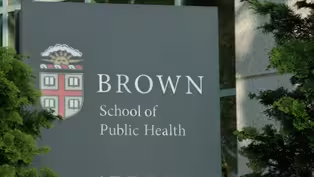
My Take: Growing up Hmong
Clip: Season 6 Episode 19 | 5m 38sVideo has Closed Captions
Isabella Jibilian’s story on a local Hmong family who talk about their history in Rhode Island.
Hmong people are an ethnic group that originated in China and have spread across the globe. Many came to the U.S. after the Vietnam War. In this segment, Johnny Kue tells his family’s astonishing story of resilience and survival.
Problems playing video? | Closed Captioning Feedback
Problems playing video? | Closed Captioning Feedback
Rhode Island PBS Weekly is a local public television program presented by Ocean State Media

My Take: Growing up Hmong
Clip: Season 6 Episode 19 | 5m 38sVideo has Closed Captions
Hmong people are an ethnic group that originated in China and have spread across the globe. Many came to the U.S. after the Vietnam War. In this segment, Johnny Kue tells his family’s astonishing story of resilience and survival.
Problems playing video? | Closed Captioning Feedback
How to Watch Rhode Island PBS Weekly
Rhode Island PBS Weekly is available to stream on pbs.org and the free PBS App, available on iPhone, Apple TV, Android TV, Android smartphones, Amazon Fire TV, Amazon Fire Tablet, Roku, Samsung Smart TV, and Vizio.
Providing Support for PBS.org
Learn Moreabout PBS online sponsorship(birds chirping) - It's pretty good to make a soup.
(light piano music) - Very few times, my mom and dad have told me they love me, but I know based on how they show me and based how they feed me.
When they feed you, it's a sign of love.
My name is Johnny Kue and this is my take on growing up Hmong.
The term Hmong means free man.
I would describe it as an ethnic group.
We don't have our own country, we have our own language.
Hmong, I guess the best way I can say it is we're not a place, we are a people.
In the Hmong tradition, a lot of our history was passed down through oral history or through tapestry.
In our culture, we call this Paj Ntaub.
This one in particular explains my family's journey exactly.
My mother and father grew up in Laos and it was around the time the Vietnam War happened that my father was recruited to join the Vietnam War.
- [Reporter] Laos, the strategic key to Southeast Asia's richest areas.
- The United States did not know how to navigate the jungles and because the Hmongs were familiar with the jungles and the terrain, they were sort of like navigators in the jungles.
When my dad was first recruited into the secret army, he was about 15 years old.
When the US left the war, they had to fight for their lives.
They were enemies of Laos and the orders were to kill the Hmong families on site or to put them in reeducation camps.
When my family were in the concentration camp and they were slated for either reeducation or they were slated to be executed, my sister, my oldest sister at the time, she was so skinny that she was able to get a hand untied from the ropes.
And after she got her hand free, she was able to untie my family.
They were able to escape those camps.
They decided to flee Laos.
The only way was to cross the river that was adjacent to Laos in Thailand.
There were soldiers that were guarding the rivers.
My sister at the time, she was probably one years old, she was on my mom's back and she slipped off and my father just said that if we go back for her, that there's a chance that we all might be dead.
But my mother was able to rescue her and they would, thankfully they were able to get across the river safely.
Eventually they did settle into Thailand where they stayed for a while until the United States offered them political refuge.
We lived in South Providence near the West End, about one block away from the Knight Memorial Library.
I have a really, really big family, seven siblings.
Four were born in Loas and Thailand, and three of us were born in the United States.
I am the last of the seven.
I am the baby of the family.
(light piano music) My father was an immigration caseworker and he would help get a lot of immigrants into Rhode Island.
A lot of the folks coming in did not have a voice and there was a lot of fear for the refugees coming in for the first time.
And my father did a lot of work with community leaders to help ease those fears and to help those early refugee settlers to become a part of the community.
So the Hmong community was always tight knit.
My father told me, if you're traveling somewhere and you're tired and it's late and you have nowhere to stay, find a phone book and you look up the last name Kue.
And you say, "Listen, I am so-and-so's son from Rhode Island.
Is it okay if we stay at your house tonight?"
And he said that they would open up their home for you.
And that's just the community that I've been taught.
There was definitely a time in my life where I was trying to suppress like who I was because I was trying to fit in.
But as I got older, I realized how important my culture was and I realized how important I need to pass this on to my son.
It became evident that, you know, everything that my family has done to raise me the right way is because of our Hmong values.
(light piano music) (light piano music) (speaking foreign language) My name is Johnny Kup and this was my take on growing up Hmong.
Video has Closed Captions
Clip: S6 Ep19 | 11m 1s | The Trump administration pulling millions of dollars in research funding from Rhode Island. (11m 1s)
Video has Closed Captions
Clip: S6 Ep19 | 8m 59s | Telepsychology offers new hope for local students amidst a growing mental health crisis. (8m 59s)
Providing Support for PBS.org
Learn Moreabout PBS online sponsorship
- News and Public Affairs

Top journalists deliver compelling original analysis of the hour's headlines.

- News and Public Affairs

FRONTLINE is investigative journalism that questions, explains and changes our world.












Support for PBS provided by:
Rhode Island PBS Weekly is a local public television program presented by Ocean State Media

